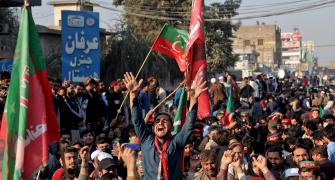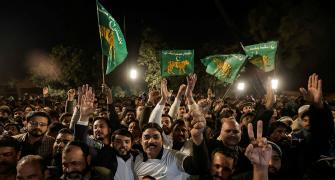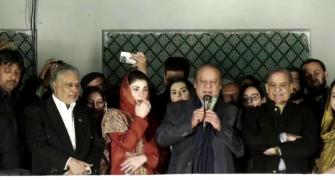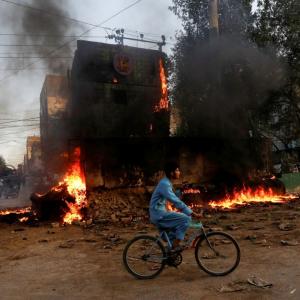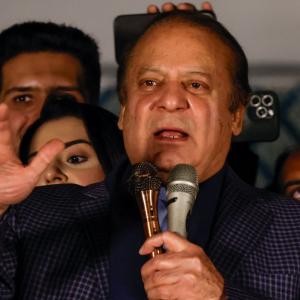'Outrage will take place sooner than later, because it's not only that their mandate has been stolen, but the most important issue right now is the sinking economy in Pakistan.'
'Inflation is 26%-27%. It is backbreaking inflation.'
'Food, energy, education, health, which are the primary things that every family requires, is going beyond the reach of the masses.'

With the Pakistan Muslim League (Nawaz) party headed by former prime minister Nawaz Sharif and the Pakistan People's Party headed by Sharif's arch rival and former president Asif Ali Zardari all set to form the next coalition government in Pakistan, with the blessings of the Pakistan army, of course, former Intelligence Bureau officer Avinash Mohananey, who spent a considerable time in Pakistan on security assignments, discusses with Prasanna D Zore/Rediff.com what could unfold in Pakistan if such a coalition government becomes a reality. The first of a two-part interview:
The elections in Pakistan took place with Pakistan Tehreek-e-Insaf President Imran Khan behind bars on alleged charges of corruption, and in which the Pakistan election commission did not allow any candidate to contest elections on PTI's election symbol, the bat.
Interestingly, independents backed by the PTI, with 95 seats, emerged as the single largest bloc in the 265-member-strong national assembly.
The Pakistan Muslim League (Nawaz) and the Pakistan People's Party secured the second and third positions with 78 and 54 seats respectively.
Who are the real winners and losers in the Pakistan elections that resulted in a fractured mandate: PTI-backed independents, PML-N, PPP or the army?
The real winners of this election undoubtedly are the people of Pakistan, the Pakistani awaam. The losers certainly are the Pakistani army and all those (political leaders) who collaborated with the army.
Why would you say the Pakistan army is the biggest loser in this election? In fact, it will get a government of its making. It has always been the kingmaker and this time will be no different?
Yes, I agree. But the kind of verdict they were expecting has not come.
The army with the kind of pre-election rigging against Imran Khan and keeping him in jail has not worked well for them in the elections. There are so many ways that they did it (influenced the outcome of general elections). They hoped that the PTI will be wiped out, or at least it will be manageable in terms of seats it will win.
But the PTI has emerged, in the form of independents, as the single largest bloc in the national assembly and in the Khyber Pakhtunkhwa provincial elections. That is indeed a big headache for the army in the days to come.
What will be the Pakistan army's role once the coalition government takes shape? And how stable will that government be?
Look, it's very difficult for this government to survive for long. Because of the internal contradictions (between these two political arch rivals), the jostling for the power between the partners will really be interesting to watch out for.
From the beginning, even right now, Zardari is saying that their power could be shared between Nawaz Sharif and Bilawal (Bhutto, the son of the late Benazir Bhutto and Zardari).
For the first half term, Sharif can become prime minister, and the second half term should be given to Bilawal Bhutto is what he is vying for. So the jostling for the power, jostling for posts, and jostling for the ministries will only further stretch the already-existing contradictions between the PML-N and PPP.
And, even though the army is all-mighty and all-powerful, it can't do the political micro-management required to keep these two opponents on leash.
Then there will be the MQM (Mohajir Quami Movement, an influential political party in Pakistan's Sindh province) to take care of.
It's very difficult for the army to do it. They may do it eventually because there is no other way to keep the whole flock together. But whether the flock will remain intact is a big question mark.

Do you see, going ahead, the people of Pakistan will hit the streets protesting against this government, because as of now, it seems that the people have overwhelmingly voted for these independents who are but PTI candidates?
With a sinking economy Pakistan is sitting on a powder keg.
Public outrage will take place sooner than later, because it's not only that their mandate has been stolen, but the most important issue right now is the sinking economy in Pakistan.
Inflation is 26%-27% and it has been consistent for more than one-and-a-half years now.
It is backbreaking inflation. Essential items, food items, energy, education, health, which are the primary things that every family requires, is going beyond the reach of the masses. The inflation impacting these items of consumption is also on the run.
The people, specifically the Pakistani youth -- and this bulge in Pakistan is more than that in India -- are finding it difficult to meet their aspirations.
These youth are not finding good education, good employment opportunities. So where are they going to go? Get into the ferries and get sunk outside Greece in international waters? This is becoming the fate of the youth of Pakistan.
That is why the anger (against the yet-to-be-formed PML-N and PPP government) will build up and the immediate cause could be shortage of wheat.
Right now, there is an agitation going on in Gilgit-Baltistan because of the shortage of wheat and even when available people cannot afford to buy because wheat has become very expensive.
It has not been reported much in the Pakistani media, but the people are protesting.
It could be small things like shortage of sugar, shortage of tomatoes. Today, Pakistan is sitting on a powder keg. A small spark can trigger huge protests.
We don't know how, we don't know where and when. But there could be very huge protests, given the political turmoil. It could be localised, it could be widespread. Nobody knows.
Pakistan is that unpredictable because the protests are very organic. It is very difficult to predict exactly how, and who will fan these protests in the absence of a credible Opposition.

